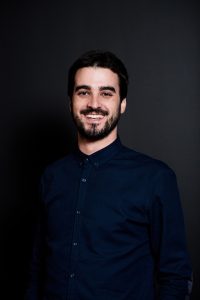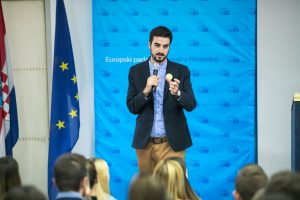Advisory Council on Youth of the Council of Europe influences key topics that are important for young people and reacts to new challenges and problems that young people face. Through the Committee of Ministers of the Council of Europe, which accepts our recommendations, we are changing the everyday lives of young people throughout the member states of the Council of Europe.
“Young people are often talked about but quite frequently for wrong purposes or in places not relevant for youth rights,“ says Marko Boko, a member of Advisory Council on Youth of the Council of Europe and adds: “We often hear young people are frequent topic, for instance, in pre-election times, in situations where young people want to be instrumentalized and exploited for something else and are given empty promises.

We heard a lot of those, and unfortunately, these are the patterns that will be repeated, while there are more and more challenges and problems that young people face every day – the socio-economic position of citizens across European countries is very difficult and young people are always the most affected.”
1. To what degree can Advisory Council on Youth of the Council of Europe influence key topics for young people?
Together with other partner organizations like the European Youth Forum (a pan-European youth umbrella organization) or national umbrella youth organizations like the Croatian Youth Network (that I represent at Advisory Council on Youth of the Council of Europe), the Council has been working on devising youth policies, improving and bolstering youth rights and youth work. This implies a set of tools and processes advocating and influencing the work of institutions, especially those in charge of youth issues, education, culture and so on, with a large number of resources and capacities invested in working with young people in the field, i.e. on empowering them and their informal education.
2. What topics that you have been working for, apart from those already mentioned, you would like to highlight?
Advisory Council on Youth of the Council of Europe consists of 30 members, with each of them responsible for several portfolios, grouped into three main areas of action: Access to Rights, Youth Participation and Youth Work and Inclusive and Peaceful Societies.
These areas cover a wide range of topics, be it socio-economic issues, informal education, working with young Roma people, inclusion of young people with developmental difficulties, inclusion of young refugees, bilateral co-operation with the Russian Federation and Ukraine, work in the Euro-Mediterranian region, work with the Congress of Local and Regional Authorities of the Council of Europe, the EU and E partnership in the youth segment, etc.
We are talking about a set of key youth issues across Europe, which are interlinked and complementary. We are trying to approach all of them in a comprehensive manner starting from research and fieldwork with young people, setting up positions and proposals for public policies and then implementing them.
During this term in the Advisory Council, which is my second term, I am in charge of the Council of Europe’s bilateral cooperation with The Russian Federation and Ukraine in the youth segment, as well as the cooperation with countries such as Belarus, Azerbaijan and the countries of our region, plus, I am also in charge of measures for the development of youth policy in the Council of Europe member states.

3. Does the fact that you are an advisory body has any bearing on how your recommendations are perceived and implemented?
Yes, we are an advisory body and we operate under the auspices of the Council of Europe’s Youth Department which conducts a range of activities and campaigns directly with young people in the field and monitors the implementation of public policies adopted at the level of the Committee of Ministers. Our council is extremely active and our activities are not only „on paper“, so to speak, but we are working with stakeholders and young people across Europe which means that results of our work are really tangible and bring about change.
It is important to underline that our Council works with government representatives in the body called the Joint Council on Youth on the principle of co-deciding, and all decisions are made by consensus, which certainly facilitates procedures carried out in higher bodies and ultimately in the work done by the Committee of Ministers. The process of co-deciding, whereby the representatives of youth organizations have the same voting rights as government representatives, is the best such example in the world and this is a mechanism that should be applied as widely as possible to youth work. This is where the motto “including youth in discussing youth” is fully implemented.
4. You are a non-partisan body, and yet all the public policy measures that are devised carry certain ideological values. Do the changes in political attitudes in Europe influence the way in which the problems of young people are dealt with?
Of course, the Council of Europe is a living political body, and you will encounter different value-related and ideological positions that are expressed to a greater or lesser extent in the Parliamentary Assembly of the Council of Europe, as well as in other bodies. I’ll give you a concrete example that is relevant which makes the youth sector in the Council of Europe quite vulnerable. The Russian Federation refuses to pay its membership fees to the Council of Europe, which has obviously reflected on the overall budget of the organization, which will, in turn, lead to cutbacks in funding of the work of certain sectors. As things are at the moment, the youth sector and the Youth Department are most at risk, and according to the worst possible scenario, our budget will be reduced by as much as 40%. This presupposes the end of a series of programs, the closure of one of the European Youth Centres, as well as the dismissal of employees, and all of this is the consequence of a political move by one of the members.
We often encounter value-related and ideological controversies in our work when it comes to the rights of the LGBT youth, young refugees and the Roma, but as we make all decisions by consensus, we are always trying to find the best solution.
5. How did Croatia’s presidency of the Council of Europe affect your work?
I would really like to underline that so far, myself and my colleague Marko Grdošić (AEGEE Europe), with whom I was in the Council’s Board of Directors, had a brilliant, very open and responsive communication with the Permanent Representation of the Republic of Croatia to the Council of Europe, i.e. with the former ambassador Miroslav Papa, Deputy Blaženka Babić and the new ambassador Toma Galli. They are now working in the youth sector of the Council of Europe and are considered the most active and the biggest fighters for youth rights and youth policy development among the ambassadors. They have always been very supportive. If you want to fight for the right thing at the level of the Committee of Ministers, this is the key support you need. During the Croatian Presidency of the Council of Europe, it is only natural that we were more in the focus of attention, but as representatives of youth organizations, we have always had very good cooperation with the Permanent Representation, which sets a very good practical example for all Council of Europe member states. I believe that such cooperation will continue in the future too.

6. Croatia’s current foreign minister is probably going to be appointed the Secretary General of the Council of Europe soon. How important is this appointment for Croatia and the stances it endorses?
Since we, as representatives of national umbrella youth organizations and international youth organizations, represent organizations and membership, not member states, it is important for us to advocate certain values and attitudes, not the interests of our respective countries. What we as the Council and young people expect is for the budget of the Youth Department and all our activities to be protected because what’s the purpose of having the Council of Europe and all the values it advocates when you won’t have anybody left in the member states to instil these values, knowledge and experience in, nor have anything to invest in the empowerment and education of young people.
The present and future of the Council of Europe and the European Union, on the other hand, rest on young people, and in order to ask and expect something from young people, we should ask ourselves first what we did for them and what we did to teach them how to think and do, not what to think and do. This is a supra-national issue that does not need to be linked to the respective countries that young people come from. We expect to have positive cooperation with Minister Marija Burić Pejčinović in her current position, and in particular when she is appointed the Secretary General of the Council of Europe, which is a huge thing for Croatia which should be talked about more in the public space.
7. The term of the Advisory Council members is two years. What should happen and what goal should you get closer to in order to say that you were satisfied with the work you had done?
At the beginning of each mandate, we are working on our two-year-operative plan, so that each priority area is assigned goals, activities and indicators of implementation. Likewise, we are working on long-term goals. We are currently working on the Agenda 2030 which the Council’s future convocations should adhere to, in principle and strategically, in their work, but the two-year operative plans are considered more important operational documents.
It is impossible to finish certain processes in a two-year- period, because of all the procedures and negotiations, but the Council is very much adhering to the continuity of work. It is crucial that some members run for another term to ensure the transfer of knowledge, experience and practices, but this is something that is decided during a democratic election process.
We are satisfied with each of our realized activities, established cooperation and small successes because, at the end of the day, they can significantly affect the quality of life and rights of young people across Europe. With the support of our parent organizations, we are always striving to do our best to achieve the best results in our work so to empower many young people and inform them of their rights, as well as to make institutions and other partners aware of the social role and importance of youth.
Support the youth in their efforts
I would like to use this opportunity to remind all your readers that they were young once and to remember everything they troubled them back then and the things they wanted to change. Nowadays, young people face even more challenges and problems, and enormous demands placed upon them, while often they are being portrayed as inadequate, unreliable and spoiled. In the time when jobs are not safe and can be lost easily if you are are lucky enough to even have one, when young people from Croatia are leaving their parents’ home much later than their counterparts in other EU countries, and when higher education is increasingly becoming a luxury, young people are still volunteering in their free time to fight for a better social position for themselves and a more just society in general. All of you who used to be our age please remember that and support us in our efforts, thus perpetuating the saying „the young shall inherit the world“, because we really will.